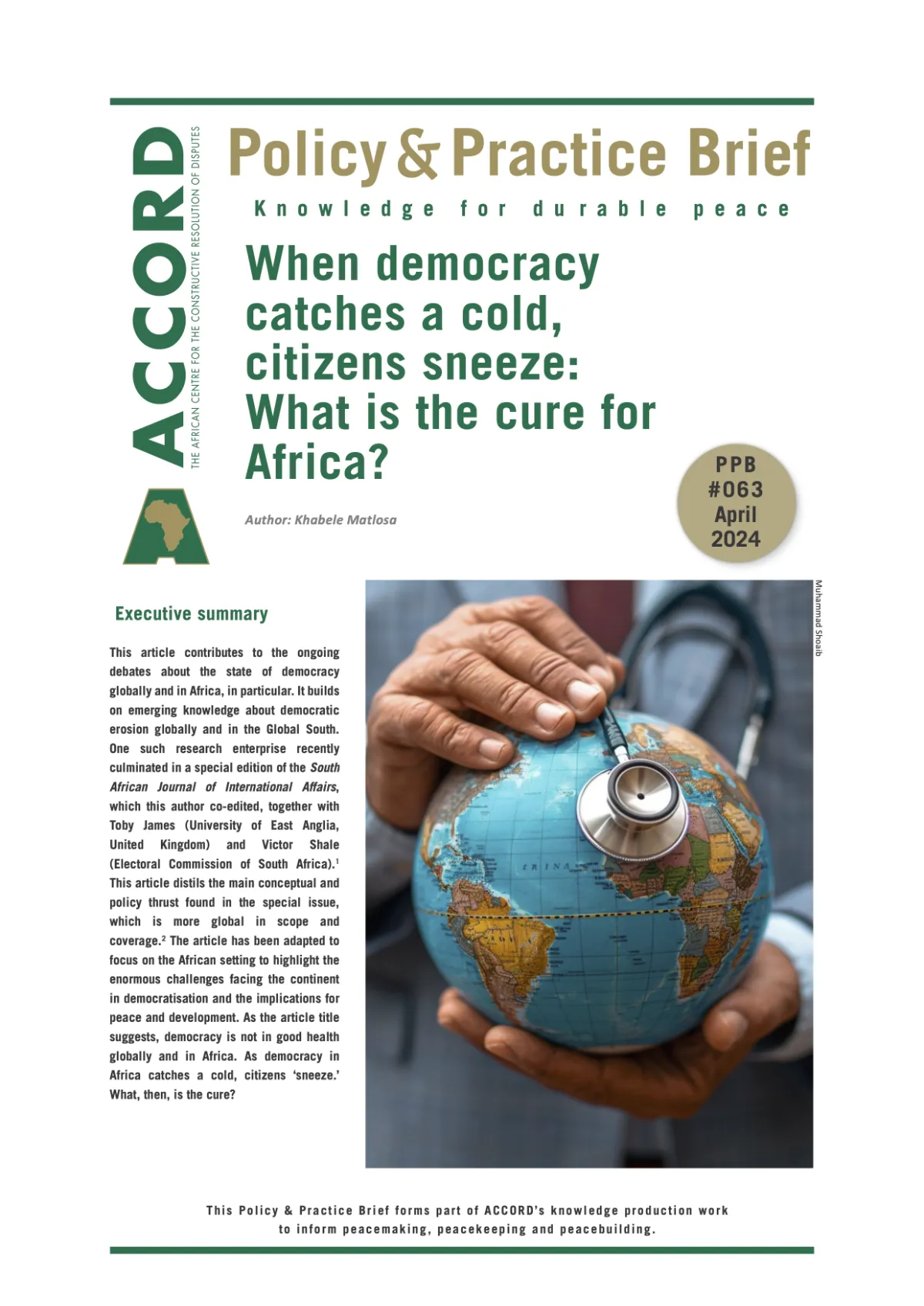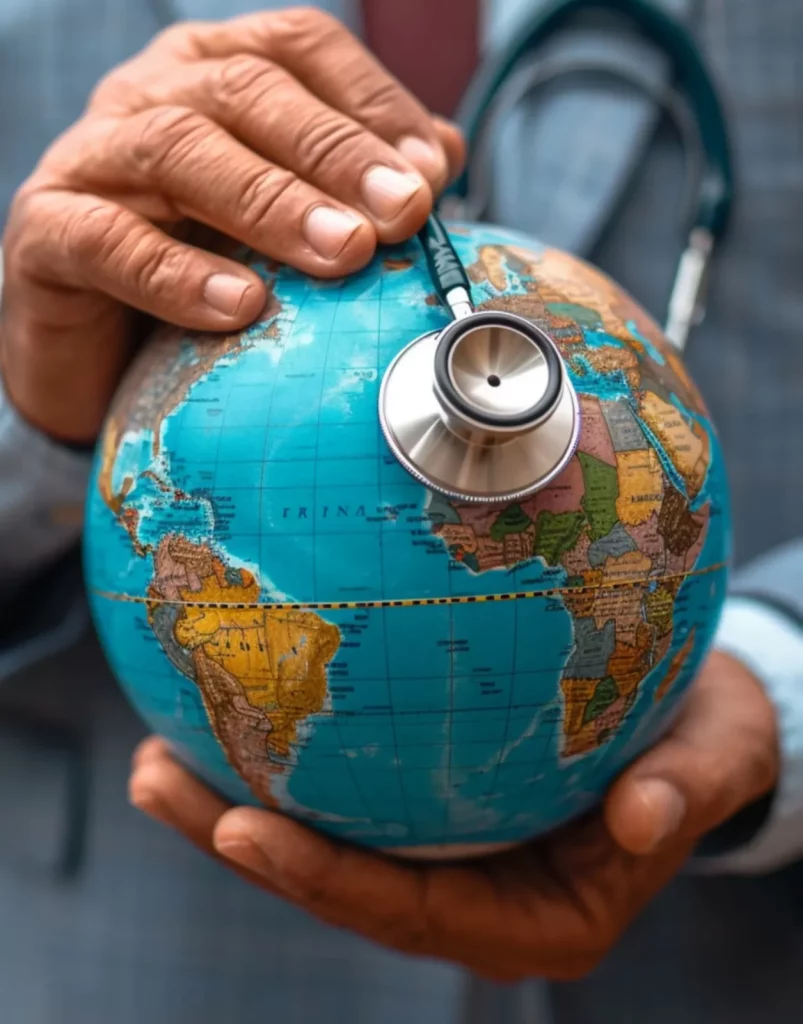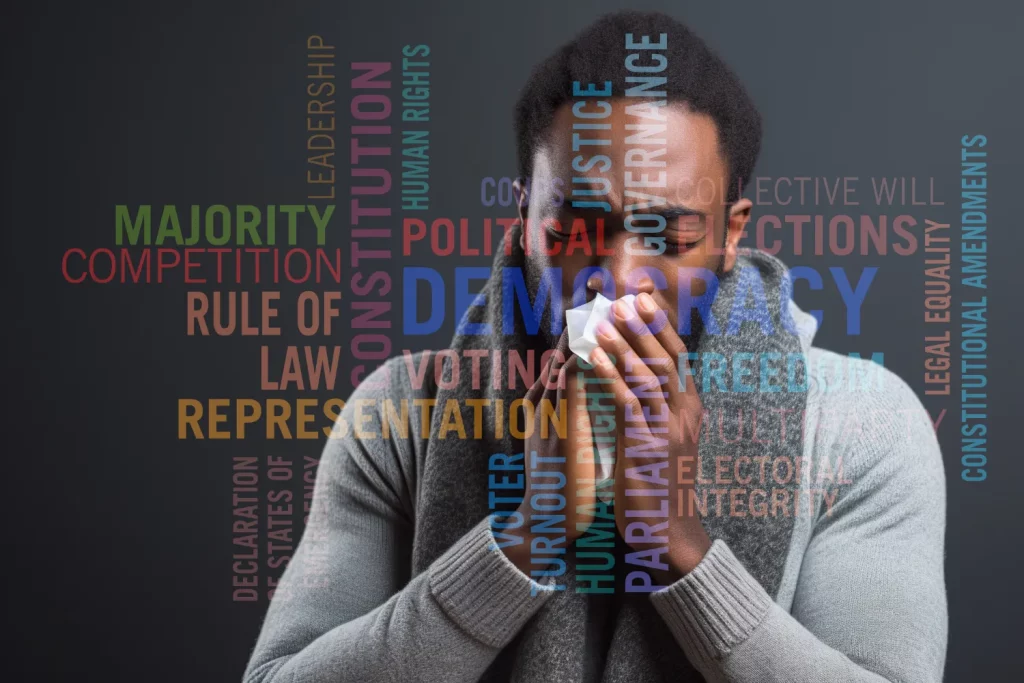
- Policy & Practice Brief
When democracy catches a cold, citizens sneeze: What is the cure for Africa?
The article focuses on the enormous challenges facing Africa in democratisation and the implications for peace and development and contributes to the ongoing debates about the state of democracy globally and in Africa, in particular.
Executive Summary
This article contributes to the ongoing debates about the state of democracy globally and in Africa, in particular. It builds on emerging knowledge about democratic erosion globally and in the Global South. One such research enterprise recently culminated in a special edition of the South African Journal of International Affairs, which this author co-edited, together with Toby James (University of East Anglia, United Kingdom) and Victor Shale (Electoral Commission of South Africa).1Shale, V.; Matlosa, K.; and James, T. (Eds) (2023) ‘Safeguarding election management bodies in the age of democratic recession – Introduction’, South African Journal of International Affairs, 30(3), 323–336. This article distils the main conceptual and policy thrust found in the special issue, which is more global in scope and coverage.2Matlosa, K. (2023) ‘Global Trends and Impact of Democratic Recession: Hard Choices for the Global South’, South African Journal of International Affairs, 30(3), 337–355. The article has been adapted to focus on the African setting to highlight the enormous challenges facing the continent in democratisation and the implications for peace and development. As the article title suggests, democracy is not in good health globally and in Africa. As democracy in Africa catches a cold, citizens ‘sneeze.’ What, then, is the cure?
Introduction
More than six decades since their independence in the late 1950s and early 1960s, the vast majority of African states have not experienced democracy that is people-centred and development-oriented. The democracy bequeathed upon Africa by the departing colonialists is essentially a carbon copy of the liberal model as it exists in the Global North. African countries have not taken measures to adapt this neo-colonial democratic experiment to their unique socio-cultural and politico-economic peculiarities, giving the wrong impression that democracy can actually be exported and imported, like apples and oranges.
Although it does have universal values and attributes, the actual workings of democracy are fundamentally context-specific. The cut-and-paste democracy from the Global North to the Global South will not deliver positive results for Africa. As liberal democracy began to recede globally, it also eroded in Africa. This trend was compounded by the onset of the COVID-19 pandemic of 2020-2022 and is currently being accentuated by global terrorism and violent extremism, as well as the raging wars in Ukraine and Palestine. Numerous civil wars in the Democratic Republic of the Congo, Sudan, the Central African Republic and Libya, as well as the generalised insecurity and instability in the Sahel belt, further compound the continent’s democracy conundrum, with dire consequences for sustainable peace, socio-economic development, and structural transformation.

Democracy catches a cold
Upon independence in the late 1950s and early 1960s, African countries adopted liberal democracies bequeathed by the departing colonial powers. However, in the majority of these countries, the multiparty democracy was jettisoned in the mid-1960s, giving way to autocratic governance of either civilian or military varieties. This is how one-party rule, one-person rule and military rule dominated Africa’s political landscape between the mid-1960s and late 1980s.
This trend changed from the 1990s to the early 2000s, leading to accelerated democratisation as part of what Samuel Huntington has dubbed ‘the third wave of democracy.’3Huntington, S. (1991) The Third Wave: Democratization in the Late Twentieth Century, Norman, OK: University of Oklahoma Press. While the major external impetus for this democratisation wave was the collapse of the Cold War, endogenous factors within Africa itself included popular struggles for fundamental rights, such as discontent with the structural adjustment programmes imposed by the World Bank and the International Monetary Fund that led to the 1980s being Africa’s lost decade of development. Equally important, the demise of apartheid in South Africa contributed immensely to the acceleration of the third wave of democracy in Africa in the 1990s.
However, since the mid-2000s, the democratisation wave has been in reverse gear. Currently, there is a general downward spiral in democracy and a concomitant upward trend towards autocratisation. In the literature, this trend is referred to variously as democratic recession, democratic erosion, democratic backsliding and democratic stress, among others. In this article, I refer to this trend as ‘democratic haemorrhage,’ that is, the decay, atrophy and degeneracy of democracy. This ‘haemorrhage’ was further exacerbated by the COVID-19 pandemic between 2020 and 2022 through the declaration of states of emergency or disaster, the deployment of soldiers in communities, the imposition of national lockdowns, and restrictions on the right of movement. The five manifestations of ‘democratic haemorrhage’ are military coups, executive coups, diminishing electoral integrity, an entrenched culture of violence, and the contradictory roles of social media.
Military coups
Since the African Union’s (AU’s) inception in 2002, and despite its zero tolerance for unconstitutional changes of government, military coups remain pervasive.4ISS. (2023) ‘Peace & Security Council Report: Special Edition focusing on unconstitutional changes of government’, Pretoria, South Africa. Table 1 shows that between 2002 and 2023, 26 successful military coups have occurred in Africa.5Matlosa, K. (2023) ‘Governance in Africa: AU achievements, challenges and prospects’, in Okumu, W. and Atta-Asamoah, A. (Eds), The Africa Union at 20: African perspectives on progress, challenges and prospects, Pretoria: ISS, pp. 158–186.
| Region | Country | Year | Total |
| Central Africa | Central African Republic | 2003 | 1 |
| Chad | 2006, 2021 | 2 | |
| Democratic Republic of Congo | 2001 | 1 | |
| Gabon | 2023 | 1 | |
| Sub-total | 5 | ||
| East Africa | Sudan | 2019, 2021 | 2 |
| Madagascar | 2009 | 1 | |
| Sub-total | 3 | ||
| North Africa | Algeria | 2019 | 1 |
| Egypt | 2013 | 1 | |
| Mauritania | 2005, 2008 | 2 | |
| Sub-total | 4 | ||
| Southern Africa | Zimbabwe | 2017 | 1 |
| Sub-total | 1 | ||
| West Africa | Burkina Faso | Feb. 2022, Sept. 2022 | 2 |
| Côte d’Ivoire | 2002 | 1 | |
| Guinea | 2008, 2021 | 2 | |
| Guinea Bissau | 2003 | 1 | |
| Mali | 2012, 2020, 2021 | 3 | |
| Niger | 2010 | 1 | |
| Sao Tome and Principe | 2003 | 1 | |
| Togo | 2005 | 1 | |
| Niger | 2023 | 1 | |
| Sub-total | 13 | ||
| Grand total | 26 |
The majority of military coups occurred in Western Africa (13), followed by Central Africa (5), Northern Africa (4), Eastern Africa (3), and Southern Africa (1).
Since 2019, 10 successful military coups have occurred in seven countries in Africa: Sudan (2019, 2021, followed by outright civil war in 2023), Mali (2020, 2021), Guinea (2021), Chad (2021), Burkina Faso (February 2022, September 2022), Niger (2023), and Gabon (2023). Since 2020, Africa has experienced 12 unsuccessful military coups: Central African Republic (17 December 2020, 13 January 2021), Niger (31 March 2021), Sudan (21 September 2021), Guinea Bissau (1 February 2022), Mali (16-17 May 2022), Sao Tome and Principe (24–25 November 2022), the Gambia (20 December 2022), Sudan (15 April 2023), Sierra Leone (31 July 2023), Burkina Faso (26 September 2023), Sierra Leone
(26 November 2023), and Guinea Bissau (30 November–1 December 2023).

Executive coups
A more complex phenomenon of ‘democratic haemorrhage’ has been the executive coups that take the form of manipulation of constitutions by incumbent heads of states to lengthen their stay in power. As the AU and Regional Economic Communities (RECs) intensified their zero tolerance for military coups, executive coups, also referred to as ‘constitutional coups’, have been on the rise.7Okeke, J. (2022) ‘Hot-Air or Resurgence? Making sense of unconstitutional changes of government in Africa’, Conflict and Resilience Monitor, African Centre for Constructive Resolution of Disputes (ACCORD), 26 May; ISS. (2023). ‘Peace & Security Council Report’, op. cit. Table 2 illustrates that between 2002 and 2023, there have been 35 amendments to constitutions in 24 African countries (that is, 45%, or close to half of AU Member States) aimed at lengthening the tenure of incumbent heads of states and governments. The amendments were successful in 29 cases in 18 countries (that is, 80% of the countries) and failed in only six cases in five countries.8Matlosa, K. (2023) ‘Governance in Africa: AU achievements, challenges and prospects’, op. cit.
| No. | Country | President involved | Mechanism | Year | Outcome |
| 1 | Algeria | Abdelaziz Bouteflika | National Assembly | 2008, 2016 | Successful |
| 2 | Benin | Patrice Talon | National Assembly | 2017 | Failed |
| 3 | Burkina Faso | Blaise Compaoré | National Assembly | 2014 | Failed |
| 4 | Burundi | Pierre Nkurunzinza | Constitutional Court, National Assembly | 2015, 2018 | Successful |
| 5 | Cameroon | Paul Biya | National Assembly | 2008 | Successful |
| 6 | Central African Republic | Faustin-Archange Touadera | Referendum | 2023 | Successful |
| 7 | Chad | Iddris Déby | National Assembly | 2005, 2018 | Successful |
| Mahamat Déby | National Assembly | 2023 | Successful | ||
| 8 | Congo Republic | Denis Sassou Nguesso | National Assembly | 2015 | Successful |
| 9 | Comoros | Azali Assoumane | National Assembly | 2018 | Successful |
| 10 | Democratic Republic of Congo | Joseph Kabila | Constitutional Court | 2016 | Successful |
| 11 | Cote d’Ivoire | Alassane Ouattara | National Assembly | 2020 | Successful |
| 12 | Djibouti | Ismaïl Omar Guelleh | National Assembly | 2010 | Successful |
| 13 | Egypt | Abdel Fattah El-Sisi |
National Assembly | 2019 | Successful |
| 14 | Gabon | Omar Bongo | National Assembly | 2003 | Successful |
| 15 | Guinea | Lansana Conté | National Assembly | 2003 | Successful |
| Alpha Condé | National Assembly | 2020 | Successful | ||
| 16 | Malawi | Bakili Muluzi | National Assembly | 2003 | Failed |
| 17 | Niger | Mamadou Tanja | Referendum | 2009 | Successful |
| 18 | Nigeria | Olusegun Obasanjo | National Assembly | 2006 | Failed |
| 19 | Rwanda | Paul Kagame | National Assembly | 2015 | Successful |
| 20 | Senegal | Abdoulaye Wade | National Assembly | 2012 | Failed |
| Macky Sall | National Assembly | 2024 | Failed | ||
| 21 | South Sudan | Salva Kiir | National Assembly | 2015, 2018 | Successful |
| 22 | Togo | Gnassingbé Eyadema | National Assembly | 2002 | Successful |
| Faure Gnassingbé | National Assembly | 2015, 2019 | Successful | ||
| 23 | Tunisia | Zine el-Abidine Ben Ali | National Assembly | 2002 | Successful |
| Kais Saied | Referendum | 2022 | Successful | ||
| 24 | Uganda | Yoweri Museveni | National Assembly | 2005, 2017 | Successful |
Recently, President Macky Sall of Senegal attempted an executive coup, postponing a scheduled election and extending his tenure by about ten months from April to November 2024. Fortunately, popular protests, disapproval by the Economic Community of West African States (ECOWAS), quiet diplomacy pioneered by Thabo Mbeki, former president of South Africa, as well as the ruling by the Constitutional Council nullifying postponement of the election had the combined effect of reversing this nefarious move by Macky Sall. Consequently, a presidential election was held in Senegal on Sunday, 24 March 2024. The election was won by the 44-year-old opposition presidential candidate, Bassirou Diomaye Faye, riding on a massive youth protest vote. Provisional results show that Faye registered a convincing victory, with 53.7% of the total valid votes, defeating Amadou Ba of the then-ruling coalition, who secured 36.2% of the votes in the first round of polling.10Crowe, P. and Ba, D. (2024). ‘Senegal’s president-elect Faye vows to govern with humility’, Reuters, 26 March. Three main factors account for Faye’s victory. The first factor is Macky Sall’s misgovernance and deteriorating socio-economic conditions that generated massive public discontent marked by popular protests over the last three years. The second relates to his political anointment and full backing by the firebrand opposition leader Ousman Sonko, who was barred from contesting the election due to perceived trumped-up defamation charges leading to his imprisonment. However, Sonko was released a week before the election. The third factor is the massive popularity of both Sonko and Faye ‘among young voters in a country where more than 60% of people are under 25 and struggle to find jobs. Faye promised to dedicate more state resources to help the youths.’11Ibid.

Diminishing electoral integrity
The diminishing electoral integrity in Africa is coterminous with the various types of Electoral Management Bodies (EMBs), their levels of effectiveness, independence and impartiality. Three types of EMBs include governmental, independent, and mixed.12IDEA. (2014) Electoral Management Design: Revised Edition, Stockholm, Sweden: IDEA. The common model is the governmental EMB. However, overall, the politicisation of EMBs remains the single most dangerous threat to electoral integrity and a major trigger of ‘democratic haemorrhage’ to date.
Often, elections in Africa tend to be violent, resulting in the loss of lives, destruction of property, depression of the economy, and forced displacement of people internally and externally. Ordinarily, there is nothing wrong with electoral conflict through contestation over state power, provided it is managed constructively and peacefully. However, there is much wrong with electoral conflict once it turns violent and contestants or belligerents aim to resolve their incompatibilities through violent means. Will the 24 elections planned for this year (2024) be violent or peaceful? Time will tell.
The contradictory role of digital and social media
The traditional media has always played a role (either positive or negative) in elections in Africa. The media’s role in elections has become increasingly complex since the onset of digital and social media. Digital and social media are a double-edged sword: they open up space for broader citizen participation, but they also facilitate distortion of the democratic process through misinformation, disinformation, fake news, deep fakes and hate speech.
In a trend that the Kenyan writer, analyst and activist Nanjala Nyabola has dubbed ‘digital colonialism,’13Ekdale, B. and Tully, M. (2020) ‘How the Nigerian and Kenyan Media Handled Cambridge Analytica’, The Conversation, 9 January. there is evidence pointing to the involvement of Cambridge Analytica in the 2015 general elections in Nigeria and the 2017 general elections in Kenya, reinforcing the fear of digital manipulation of elections in Africa. This trend opens up African elections to foreign influences and interests with deleterious consequences for democratisation, by and large. They make a mockery of multiparty elections on the continent. It was only in early 2020 that Kenya and Nigeria signed into law the Data Protection Bill and the Data Protection Regulation, respectively.14Ibid.
In Kenya, Cambridge Analytica played a key role in both the 2013 and 2017 elections in support of President Uhuru Kenyatta. Kenyatta won both elections against Raila Odinga. Cambridge Analytica wrote the manifesto of Kenyatta’s Jubilee Party, prepared campaign speeches for Kenyatta, and conducted two surveys of 50 000 people in both elections to ascertain the voters’ needs, hopes and fears, as well as their preferred information channels. The survey results reverberated beyond social media campaigns and were translated into non-internet platforms like radio, television advertisements, billboards and newspaper articles.15Moore, J. (2018) ‘Cambridge Analytica Had a Role in Kenya Elections too’, New York Times, 20 March. They abused voters’ Facebook data and made it accessible to political parties, government institutions, and the electoral commission without their knowledge and consent, largely targeting young people.
In Nigeria, during the 2015 general elections, a wealthy Nigerian hired Cambridge Analytica to support President Goodluck Jonathan’s re-election bid. During the campaign, the firm worked closely ‘with the Israeli intelligence firm, Black Cube, to acquire hacked medical and financial information about Jonathan’s opponent, Muhammadu Buhari. Cambridge Analytica also promoted a graphic anti-Buhari video. The video suggested that Buhari would support Boko Haram and end women’s rights.’16Ekdale, B. and Tully, M. (2020) ‘How the Nigerian and Kenyan Media Handled Cambridge Analytica’, op. cit. In the end, however, Jonathan lost the election to Buhari.

Citizens sneeze
Two glaring impacts of ‘democratic haemorrhage’ are citizens’ loss of faith in elections and declining public trust in governance institutions. Loss of faith in elections is more pronounced among the youth. It manifests through declining voter turnout.17See http://www.idea.int It is also more pronounced in local government elections and referenda. Low citizen participation in elections imperils the vitality and vibrancy of democracy. One of the major challenges facing the upcoming 24 elections in Africa in 2024 will be low voter turnout.
For instance, South Africa has scheduled its general election for 29 May 2024. What does this election portend in terms of citizen participation and voter turnout? South Africa experienced a political transition from the autocratic apartheid system to a representative democracy in 1994. While during apartheid, the majority of citizens were excluded from governance processes, including elections, in the post-apartheid era, citizen participation forms the core element of governance. Since 1994, the country has held six national and provincial elections (1994, 1999, 2004, 2009, 2014 and 2019) on the basis of the Proportional Representation (PR) electoral system. All six of the national elections have been won by the African National Congress (ANC), resulting in a political system premised on the dominant party system. However, in recent years, as shown by the 2019 election, the ANC political hegemony is progressively waning, making prospects for coalition governments at provincial and/or national level more likely following the 2024 general elections. Table 3 illustrates voter turnout in South Africa’s general elections since 1994.
| Year | Total registered voters | Total votes cast | Percentage of voter turnout (%) |
| 1994 | 22 709 152 | 19 726 610 | 86.87 |
| 1999 | 18 172 751 | 16 228 462 | 89.28 |
| 2004 | 20 674 923 | 15 863 558 | 76.73 |
| 2009 | 23 181 997 | 17 919 966 | 77.30 |
| 2014 | 25 388 082 | 18 654 771 | 73.48 |
| 2019 | 26 756 649 | 17 672 851 | 66.05 |
What is evident from Table 3 is a downward trend in terms of voter turnout between the 1994 election (86.87%) and the 2019 election (66.05%). Fortunately, voter turnout in South Africa is still above 50%, unlike in Lesotho, where it has plummeted far below 50%. As part of its transition from military autocracy to multiparty democracy, Lesotho held a general election in 1993. The voter turnout during that election was 74.7%. Subsequent elections, amidst incessant political instability marked by a series of snap elections, witnessed a dwindling voter turnout of 60.7% in 1998, 54.8% in 2002, and 51.3% in 2007. This downward spiral in citizen participation in elections became worse with the onset of coalition governments since 2012, with voter turnout as follows: 39.6% in 2012; 38.8% in the 2015 snap election; 40.0% in the 2017 snap election, a slight improvement; and a further decline to 38.9% in the most recent election in 2022.
Dwindling public trust in leadership institutions reinforces democracy fatigue under conditions of ‘democratic haemorrhage,’ as shown by Afrobarometer Round 9 survey data covering 39 countries from 2021 to 2023. This data illustrates that the institutions that enjoy the trust of the majority of citizens are religious leaders (68%), the army (62%), traditional leaders (56%), and courts of law (50%). The less trusted institutions are opposition parties (38%), parliament (38%), ruling parties (39%), local government councils (40%), EMBs (40%), police (46%), and the presidency (47%).19Afrobarometer. (2024) ‘Summary of results: Afrobarometer Round 9 survey in South Africa, 2021/2023’, Available at: https://www.afrobarometer.org/wp-content/uploads/2024/03/Summary-of-results-South-Africa-Afrobarometer-Round-9-7mar24.pdf One of the glaring implications of dwindling public trust in governance institutions is that it reduces the value of elected institutions and opens the floodgates for populist autocracy through military or executive coups.

Three prescriptions for the cure
Africa faces various choices in addressing democratic recession. Three main schools of thought have informed these choices, namely, the status quo ante school, the reformist school, and the transformative school. The first school propounds the idea that the current liberal democratic model, as applied in Africa, is adequate, but needs strengthening, especially in its institutional foundations.20Gyimah-Boadi, E. (2021) ‘Democratic Backsliding in West Africa: Nature, Causes, Remedies’, Geneva, Kofi Annan Foundation, November. The second is a reformist school that proposes adjusting the model more towards a consensual democracy defined as ‘an approach to government that combines a strong commitment to multiparty elections and accountability with a concern for unity and stability’21Cheeseman, N. and Sishuwa, S. (2021) ‘Africans want consensual democracy – why is that so hard to accept?’ The Conversation, 11 July. weaved into the indigenous African political systems. The third is the transformative school, whose core argument is that Africa needs to steer its democratic model beyond liberal trappings and towards developmental democracy.22Ake, C. (1996) Democracy and Development in Africa, Washington: The Brookings Institution. The transformative school resonates with Amartya Sen’s ‘development as freedom’ thesis.23Sen, A. (1999) Development as Freedom, London: Oxford University Press. It is this third school that has major potential to reverse ‘haemorrhaging,’ thereby revitalising democracy in Africa. It is imperative that African think tanks and scholars invest sufficient intellectual energy, time and resources in researching and designing a democracy model suitable to Africa’s particular socio-cultural and politico-economic contexts, while still adhering to the universal values, principles and norms of democracy as we know it.
Conclusion
Since independence in the late 1950s and early 1960s, Africa has experimented with a foreign democracy model bequeathed from the Global North as a relic of colonialism. It is no wonder that when that model began to experience a crisis from the 2000s to date, this also rubbed off on Africa. This crisis has taken the form of what is variously dubbed democratic recession, democratic erosion, democratic backsliding, and democratic stress, which I prefer to term ‘democratic haemorrhage’ (i.e., decay, atrophy and degeneracy of democracy). To address the adverse impact of ‘democratic haemorrhage’ in Africa, a two-pronged transformation or paradigmatic shift is needed:
- Africa’s democracy has to be transformed towards an Afro-centric (read Pan-African) governance paradigm;24Haang’andu, P. and Beland, D. (2019) ‘Democratization Without Westernisation? Embedding Democracy in Local African Cultures’, Politikon, 6(2), 219-239.
- And Africa’s democracy has to be decolonised and transformed towards a developmental (read social) paradigm.25Adedeji, A. (2006) ‘Democracy and Development: A Complex Relationship’, in Matlosa, K.; Elklit, J. and Chiroro, B. (Eds), Challenges of Conflict, Democracy and Development in Africa, Johannesburg: EISA Books; Ake, C. (1996) Democracy and Development in Africa, op. cit.; Ake, C. (2000) The Feasibility of Democracy in Africa, Dakar: CODESRIA Books; Matlosa, K. (2017) ‘The State of Democratisation in Southern Africa: Blocked Transitions, Reversals, Stagnation, Pogress and Prospects’, Politikon, 44(1), April, 5–26; Edigheji, O. (2020) Democracy Without Development: How to Fix It, Abuja: A’lime Media Limited.
Transformation towards these two goals is not merely a technocratic but a fundamentally political process. It should not be left to the political class alone. It requires broad-based popular participation by citizens, leaving no one behind.
Africa has to transcend the current procedural democracy confined to regular (s)elections, which are mere ritualistic power-plays by elites facilitating their rotation around control, use and abuse of state power. It fails to address the needs, interests and concerns of the ordinary citizens. Citizens are often mobilised during elections and demobilised between elections. Africa needs a substantive democracy that puts bread on the table for ordinary citizens instead of the current model that requires citizens to endure long hours travelling to polling stations every five years, even on hungry stomachs. The current model is a democracy that empowers elites and disempowers ordinary people. People eat bread and not ballots. Unfortunately, for the majority of poor citizens in conflict-ridden Africa, bread is a rare commodity, while ballots and bullets are in abundant supply. The democratic transformation required in Africa ought to be firmly rooted in the theory and practice of post-colonialism: the quest for the non-Western world and peoples to determine their own destinies in dignity without imposed agendas from the West.26Young, R. (2020) Post-Colonialism: A Very Short Introduction, London: Oxford University Press. It should be recognised that, given the unfettered hegemony of the West over the rest of the world, such transformation may invite economic sanctions and even military interventions, as the cases of Afghanistan, Iran, Iraq, Cuba and Libya vividly illustrate.
Author
Khabele Matlosa is the Director at the Strategic Institute for Research and Dialogue in Maseru, Lesotho and Visting Professor at the Centre for African Diplomacy and Leadership, University of Johannesburg, South Africa. He is the former Governance Advisor at the United Nations Development Programme (UNDP) Regional Service Centre, Addis Ababa, Ethiopia and former Director at the Department of Political Affairs, AU Commission, Addis Ababa, Ethiopia.
By:

